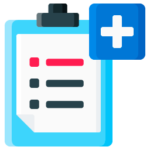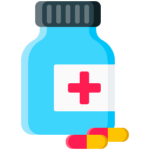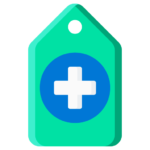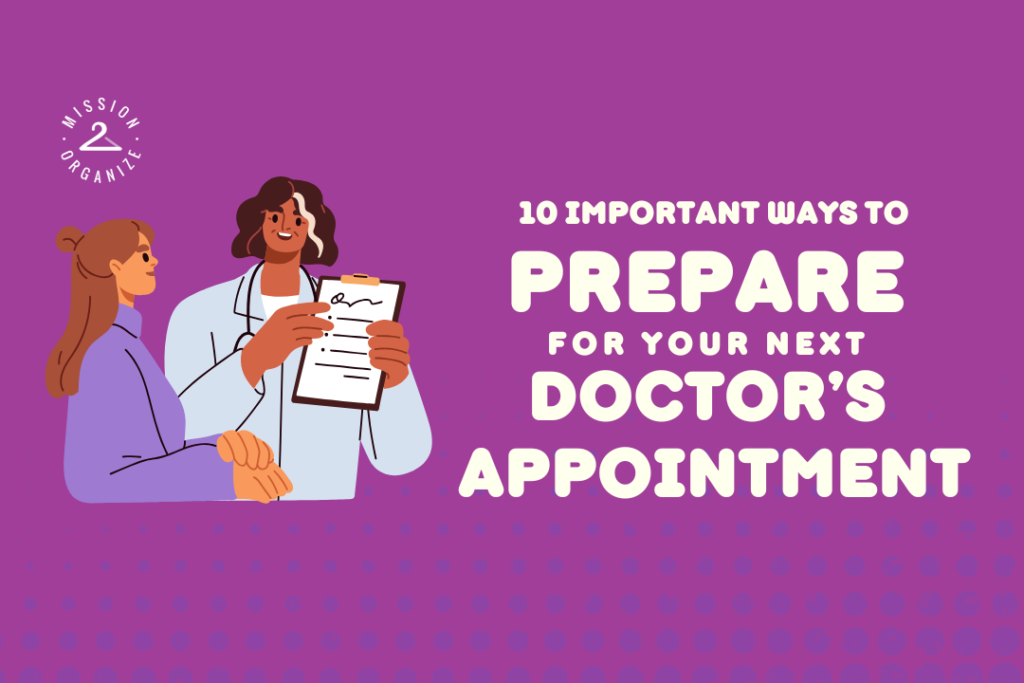When you think about organizing, you may only think about rearranging the items in your bathroom cabinet or decluttering your expired medicine. Organization is about so much more! Like organizing your day, keeping an up-to-date calendar and preparing for a productive day. One time when it is especially important for us to be prepared is prior to a doctor’s appointment.
Whether it’s an appointment with a private GP in London or in the local surgery, there can be a lot to prepare. It’s not every day that we take a trip to the doctor and it’s not cheap either. Therefore, it’s best to take advantage of having an educated health professional right in front of you by being prepared.
You’d hate to get home and realize that you forgot to tell your doctor about a medication you regularly take or a persistent symptom that you’ve been suffering from.
Follow the 10 steps below and you won’t regret a thing after your next doctor’s appointment.

Write down the main symptoms you are experiencing
Prior to your doctor’s appointment, take note of the symptoms you are experiencing. Have one chief complaint (the thing which is bothering you the most) in mind. Write down your main symptoms which will give the doctor a starting point for asking for more details. In order to make a proper diagnosis, the doctor must know what is going on. You never know which detail will be the one that breaks the case, so to speak.



Write down any medication and vitamins you are taking
It is crucial that your doctor know exactly which medications you are taking. This includes prescriptions, over the counter medicine, vitamins and herbal remedies. Detail the dosage as well as how often you take them. There could be interactions taking place that you are unaware of. The more details your physician knows, the better.


Write down any questions you have
When you’re at home or work it seems like there are so many questions you have that arise about your health. While you may find yourself searching for answers online, your doctor knows you and your specific circumstances best. Documenting your concerns while you’re clear-headed is the best way to remember your questions once you arrive in the doctor’s office.


Know your medical history
Sharing your own medical history with your physician is imperative. There is currently no universal medical database in the United States. If you have been previously diagnosed with a disease sharing it with your new doctor is the only way they will know about it. Also share any recent test results. Equally as important, is for you to share your family’s medical history. It may be that an ailment your mother suffered from makes you more susceptible for the same diagnosis. It also may qualify you for additional testing which you otherwise would not be considered for.


Prepare to be honest!
We all know it’s not always easy to be completely open about our own medical issues and concerns. However, if there is one place that you can feel comfortable spilling the beans, it’s at the doctor’s office. A part of the Hippocratic Oath, by which physicians abide, states that they will respect the privacy of the patient. By offering a complete and unadulterated picture of what is happening to you, you give your doctor the best opportunity to diagnose your ailments.


Fill out office paperwork in advance
Many offices now offer you the opportunity to fill out lengthy paperwork in advance from the comfort of your own home. When making your appointment, ask if this options is available. Taking care of it beforehand allows you to spend time ensuring that your answers are accurate and detailed.


Know your insurance coverage
Insurance coverages and requirements are one of the great mysteries of the universe. Educate yourself on the ins and outs of your particular plan before you arrive for your appointment. First of all, know if you are required to pay a co-pay. Then reconfirm which procedures are covered by your plan. Brushing up on these specifics could save you a boat load of money in the long run.


Bring all of your information with you
Writing down your symptoms, medication, questions and coverages won’t do you one bit of good if you don’t bring it with you! Collect all of this information plus any recent test results and your insurance card and place them in an envelope near the door or in your purse the night before your scheduled appointment. This helps to avoid any last minute distractions that may arise causing you to forget to bring this critical information.


Prepare to take notes
We don’t know about you but once we get in the doctor’s office, our brains turn to mush! The physician provides a lot of information in a short amount of time. Remembering everything they’ve said is darn right impossible. Pack a notebook, piece of paper and pen or electronic note taking device so you can keep up with, record and review all of the valuable details you’ve been given. You don’t want to miss out on any crucial information or complicated verbiage after all!


Prepare to stay a while
Let’s be honest; an appointment at the doctor’s office is not exactly the most efficient process. Come prepared to be patient. Likely you will have your phone to keep you entertained. However, if you bring a good book with you, you may lose track of time while you’re taken away to another fantastic universe. Pack up a few snacks and a refillable bottle of water (or tea mug in our case) so you’ll feel comfortable and prepared. Avoid scheduling any other appointments or commitments immediately following your scheduled appointment.
Take these steps to prepare for your next doctor’s appointment and you will you be able to take advantage of the time that much more. Plus, you and your physician will have a more efficient and stress-free experience.
Are there any other things you do to prepare in advance of your medical appointments? Comment below to benefit all of our readers. Stay healthy, happy and out of the hospital!







